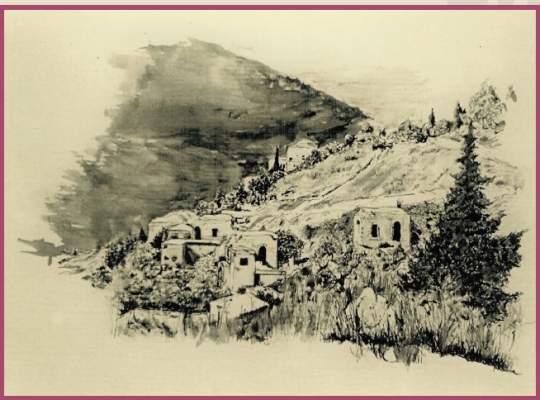An Incident in Lifta
I am a painter, a landscape watercolorist. Once I would sit outside in nature, in the fresh air, working painstakingly on a painting for six hours each day, beginning at seven in the morning. I'd leave home at five-thirty, tread through streets still silent with sleep, a Jerusalem shadowless monochrome. At this hour there is a sanctity in the city, the vibrations of dreams and the rising sun, a sensation of being its only inhabitant.
Then, around seven, when the city has fully awakened and the streets begin to fill with footsteps and chatter and vehicles, the holiness disappears, replaced by mundane energies, a return to a flat world. There was a lighter feeling in my fingers between six and seven am, different from that of the rest of my painting day, as I sat observing shadows shortening until, at noon, they were present only under the trees, where, mostly, I would sit.
An eighty-five-year-old artist I knew once would go out every day and paint olive trees on huge pieces of paper, and in each trunk he depicted figures, animals, humans. This was so subtle you had to look a few times and then the figure manifested. One day I was sitting underneath one of these old olive trees, broad of trunk and magnificently gnarled, when a woodpecker decided to search for his meal on the other side. Oh, did I jump!
One morning I went out to paint with an artist acquaintance, to a village on the outskirts of the town, Lifta, which had been partially destroyed by the army after the 1948 War of Independence because the Arab residents were shooting at us from their homes. After an hour, my friend got up to leave and I was alone. I had painted here before, always in peace.
So here I was in Lifta, with the picturesque remains of stone homes and the mountains surrounding, with a friend of mine who decided to leave and I was alone, completely alone, sitting in a little niche in the ground, like a bird on a nest. Almost immediately, from down the hill, came a man, short, skinny, swarthy, a kippa on his head. "Shalom", he said, "How are you?"
When I'm concentrating with such intensity as I do when I'm painting, it's difficult to speak, and when a man, or certain men, try to get your attention, it's best not to make eye contact, not to reply.
"Answer me!" he demanded, shouting. I continued to paint, frightened now.
"Answer me!", again, louder, and picked up a big rock. "I'm going to kill you…"
I screamed my friend's name but she was gone. He was on the dirt path directly above my head and that rock would have had to do a lot of acrobatics to miss me.
"Help, save me", I screamed, aware of how melodramatic I was being. Then a younger man appeared coming up the hill, taller, darker skinned, also wearing a kippa, took the rock, took the other's arm, and led him away, all without a word. I was shaking for a long time before I could pack up my things and leave.
I went to the police.
"Names and addresses, please".
"You think I'm going to go back and ask them?"
The police never checked it out. But a couple of months later I was on a bus and spied the two on the street, near the Mahane Yehuda outdoor market. Still believing in justice, I got off the bus, told a policewoman, who called for backup, and the men were taken to the police station. I went also, but insisted I go in a different police car.
"No witnesses, no case", said the officer in charge, at about the same time that the almost-stone thrower said he was going to kill me, right there in the police station, and let them go.
I didn't see them again for a few years. There had recently been an article in one of the papers about two men living in a ruin in Lifta without electricity or water, who worshipped the sun and walked with their faces upwards through the streets of Jerusalem, with tiny books of Psalms in their shirt pockets. So it happened that I was waiting for the traffic light to change at the intersection of King George and Ben-Yehuda when a commotion caused me to look to my left and there they were, coming up the street, swerving between cars like happy drunkards. I stepped back from the curb, looked the other way. There were so many people crowded there waiting for the green signal, I felt myself invisible, and anyhow, how could they possibly have remembered me?
Suddenly, the would-be stone thrower came up to me, stopped, his face almost touching mine ."Do you forgive me?" he asked.
Absolutely stunned, I replied, "Yes", and on they continued, flirting with the cars with their own sense of the absurd.
Shortly afterwards there were reports that they had been arrested after an arsenal of weapons and explosives had been found cached in the abandoned home in which they were living in Lifta. Their plan had been to blow up the Dome of the Rock that day, the next week, anyhow, very soon. They spent the next eight years in prison.
I sold the painting of Lifta several years later without telling the buyers the story behind it .








Comments